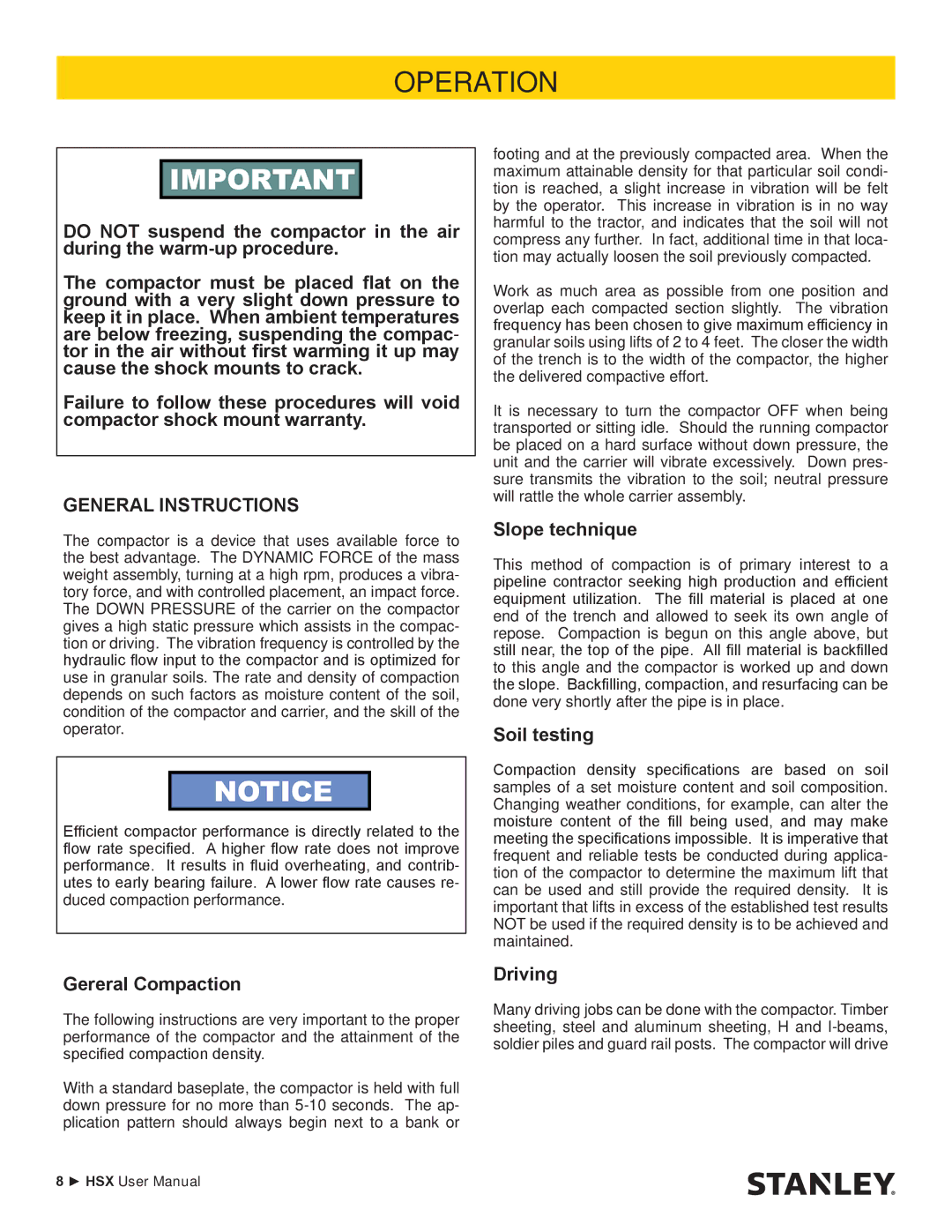
OPERATION
IMPORTANT
DO NOT suspend the compactor in the air during the
The compactor must be placed flat on the ground with a very slight down pressure to keep it in place. When ambient temperatures are below freezing, suspending the compac- tor in the air without first warming it up may cause the shock mounts to crack.
Failure to follow these procedures will void compactor shock mount warranty.
GENERAL INSTRUCTIONS
The compactor is a device that uses available force to the best advantage. The DYNAMIC FORCE of the mass weight assembly, turning at a high rpm, produces a vibra- tory force, and with controlled placement, an impact force. The DOWN PRESSURE of the carrier on the compactor gives a high static pressure which assists in the compac- tion or driving. The vibration frequency is controlled by the hydraulic flow input to the compactor and is optimized for use in granular soils. The rate and density of compaction depends on such factors as moisture content of the soil, condition of the compactor and carrier, and the skill of the operator.
NOTICE
Efficient compactor performance is directly related to the flow rate specified. A higher flow rate does not improve performance. It results in fluid overheating, and contrib- utes to early bearing failure. A lower flow rate causes re- duced compaction performance.
footing and at the previously compacted area. When the maximum attainable density for that particular soil condi- tion is reached, a slight increase in vibration will be felt by the operator. This increase in vibration is in no way harmful to the tractor, and indicates that the soil will not compress any further. In fact, additional time in that loca- tion may actually loosen the soil previously compacted.
Work as much area as possible from one position and overlap each compacted section slightly. The vibration frequency has been chosen to give maximum efficiency in granular soils using lifts of 2 to 4 feet. The closer the width of the trench is to the width of the compactor, the higher the delivered compactive effort.
It is necessary to turn the compactor OFF when being transported or sitting idle. Should the running compactor be placed on a hard surface without down pressure, the unit and the carrier will vibrate excessively. Down pres- sure transmits the vibration to the soil; neutral pressure will rattle the whole carrier assembly.
Slope technique
This method of compaction is of primary interest to a pipeline contractor seeking high production and efficient equipment utilization. The fill material is placed at one end of the trench and allowed to seek its own angle of repose. Compaction is begun on this angle above, but still near, the top of the pipe. All fill material is backfilled to this angle and the compactor is worked up and down the slope. Backfilling, compaction, and resurfacing can be done very shortly after the pipe is in place.
Soil testing
Compaction density specifications are based on soil samples of a set moisture content and soil composition. Changing weather conditions, for example, can alter the moisture content of the fill being used, and may make meeting the specifications impossible. It is imperative that frequent and reliable tests be conducted during applica- tion of the compactor to determine the maximum lift that can be used and still provide the required density. It is important that lifts in excess of the established test results NOT be used if the required density is to be achieved and maintained.
Gereral Compaction
The following instructions are very important to the proper performance of the compactor and the attainment of the specified compaction density.
With a standard baseplate, the compactor is held with full down pressure for no more than
Driving
Many driving jobs can be done with the compactor. Timber sheeting, steel and aluminum sheeting, H and
8 ► HSX User Manual
